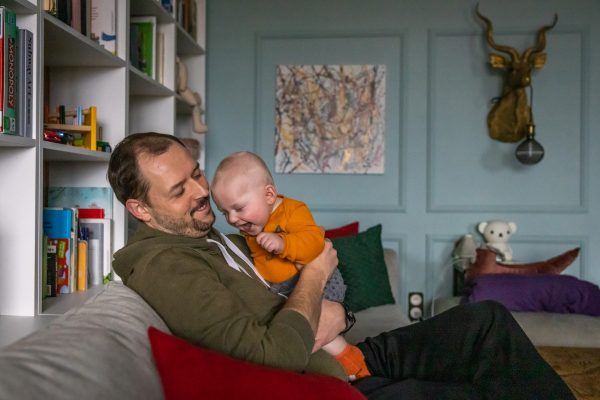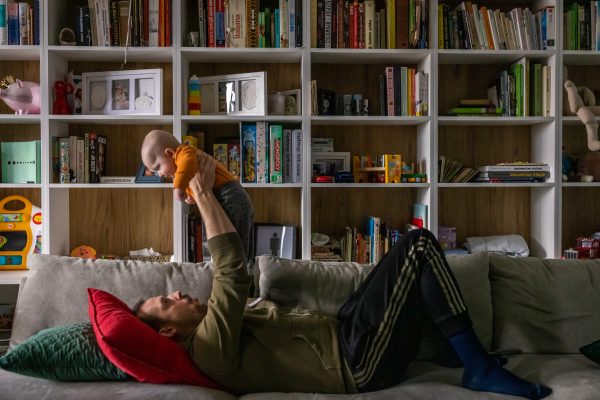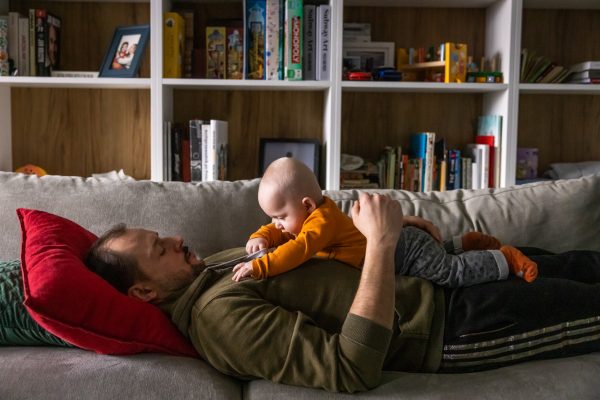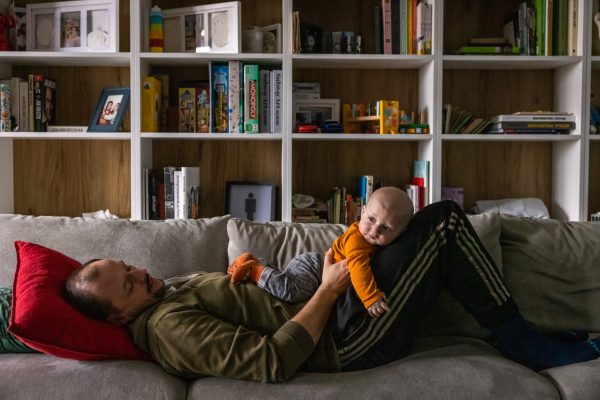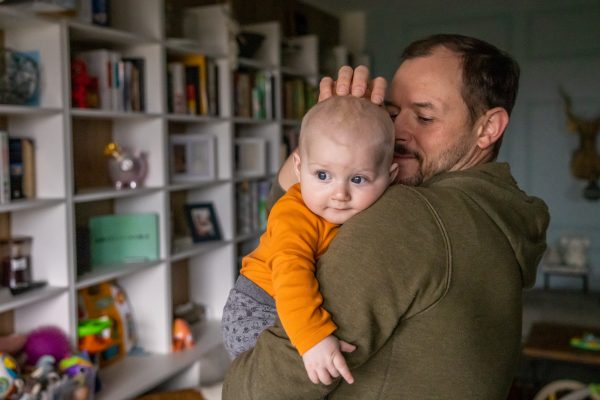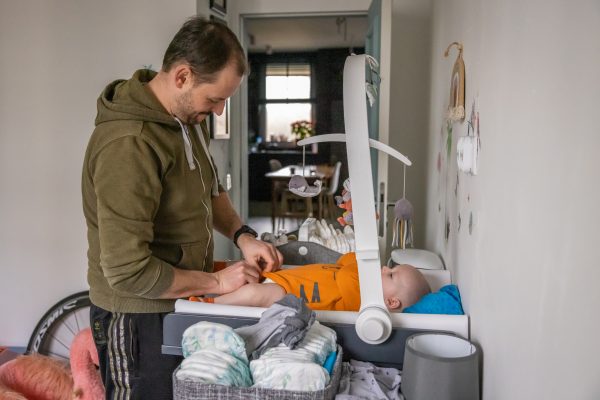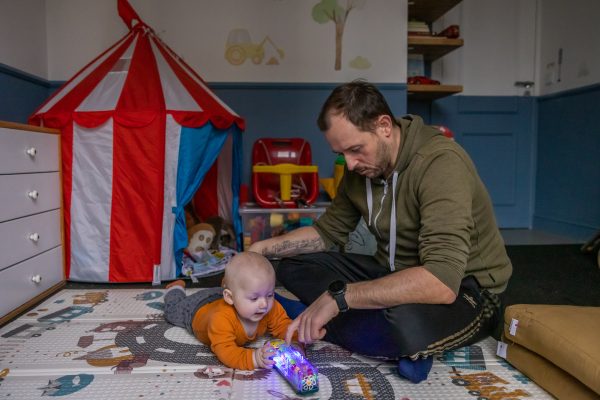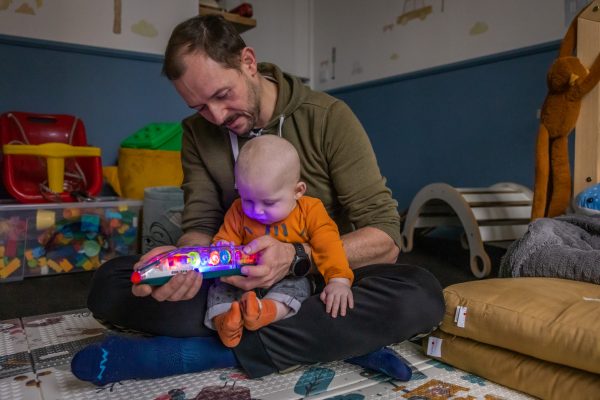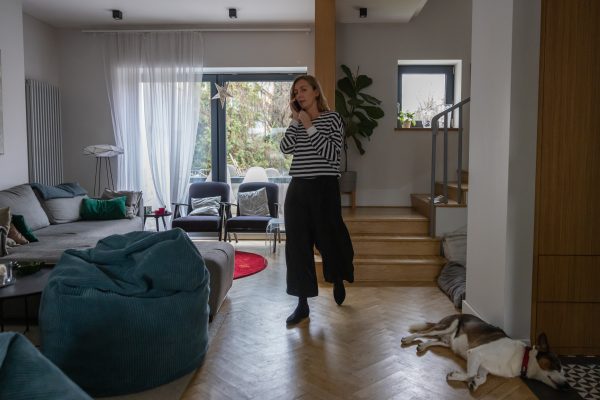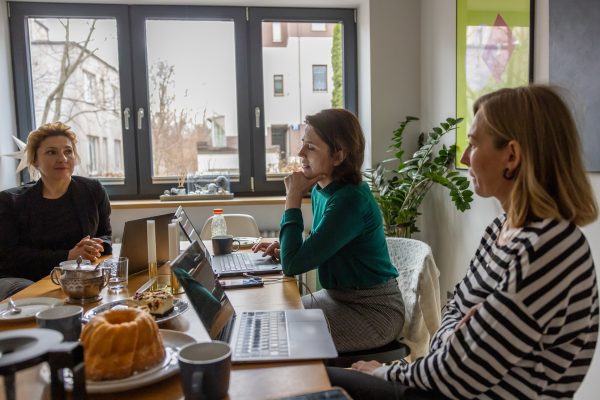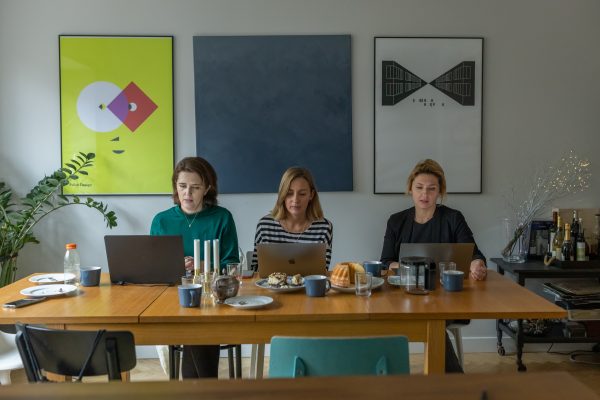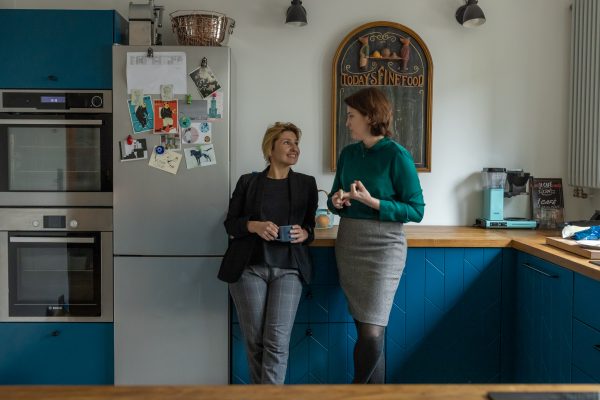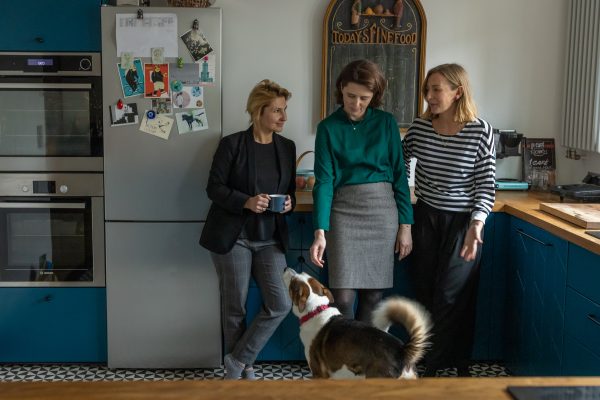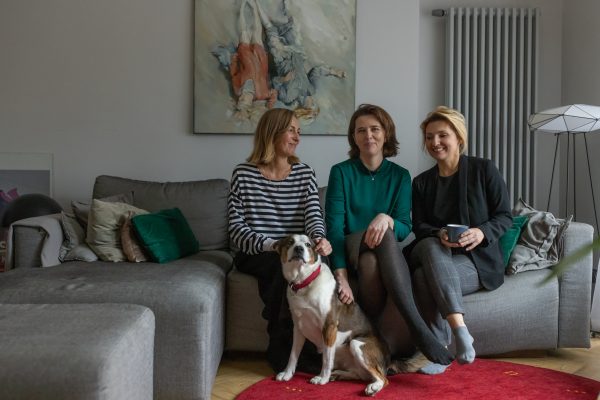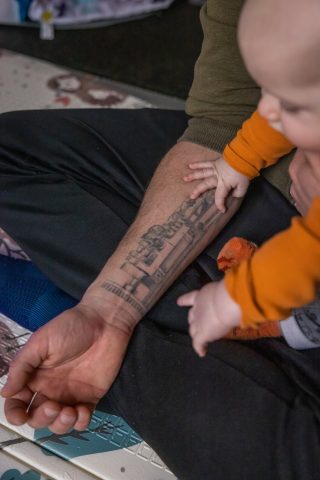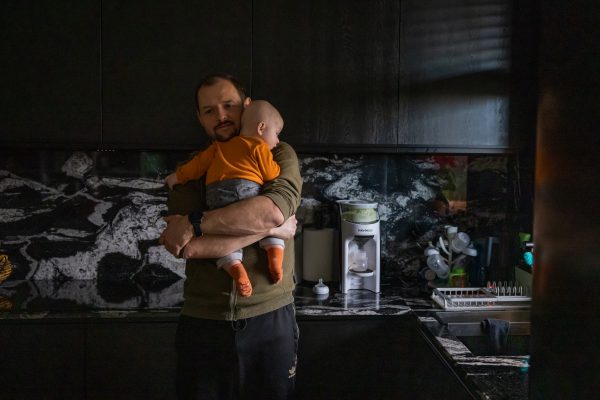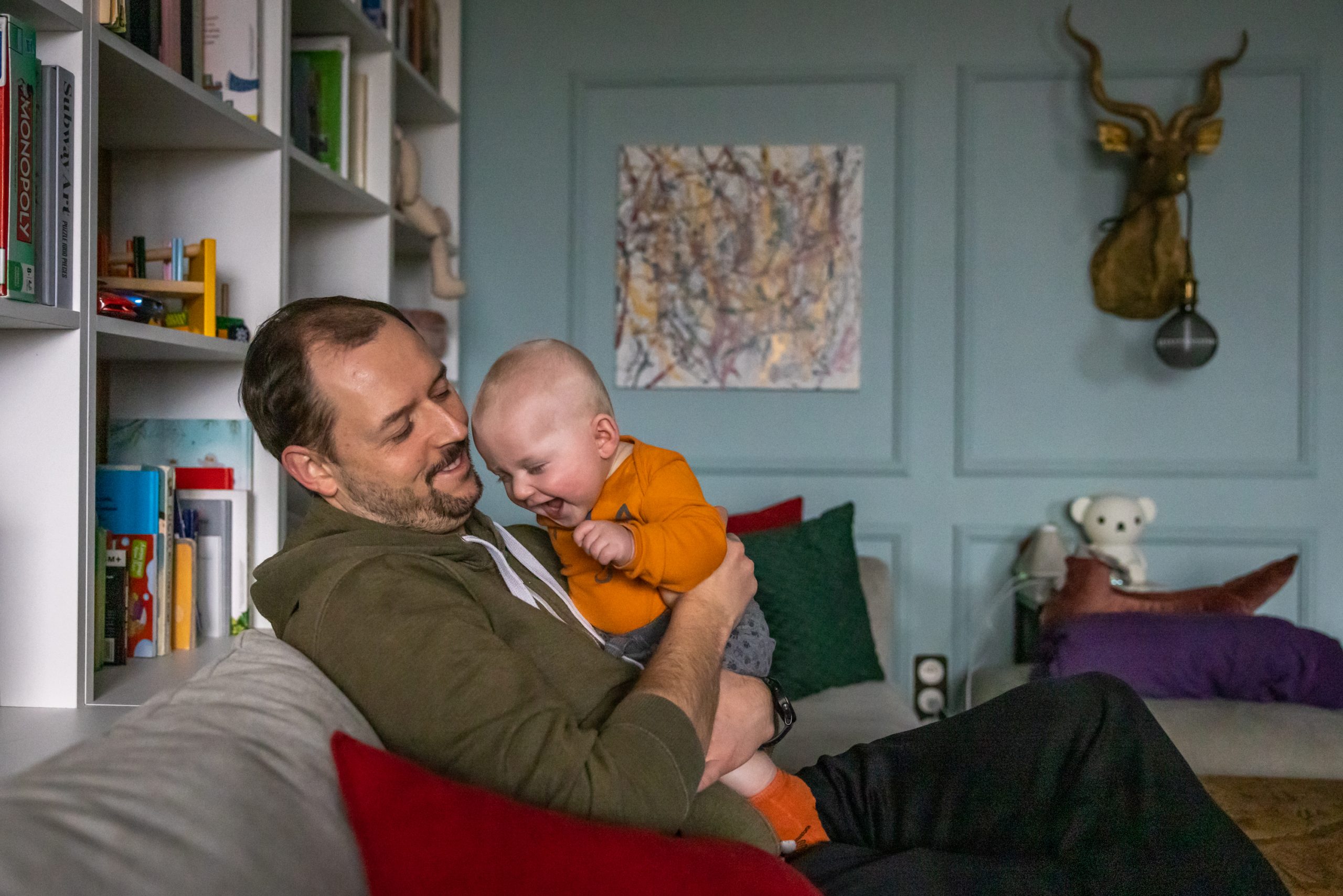
Fathers who go on parental leave say that it is the best decision that they could have made – say the women who founded the Share the Care Foundation – surveys prove that this makes a relationship more stable, reduces the divorce and separation rate, and is highly beneficial for the emotional and cognitive development of children. At the same time, it helps women pursue a career and gives them equal opportunities to compete with men on the job market.
In April 2023, the Work-life Balance Directive was implemented in Poland, giving fathers nine weeks of parental leave which cannot be transferred to their partner. We strongly recommend that fathers take advantage of this!
The first case
Jacek pulls up the sleeve of his black top to reveal a tattoo at the top of his right arm showing a complicated device with a large screw. – This is one of the first devices used to bore out an underground railway in the eighteen hundreds, the kind used to build the underground railway for example in London or New York – he goes on to explain, and the tattoo was not chosen at random. Jacek also works on construction of an underground railway, the Warsaw metro. He is an architect. Just over ten years ago, he and some work colleagues won a competition for a number of stations, C6, C7, and C8, as they are referred to in the trade. He played a part in the construction of a number of stations on metro line no. 2 – Płocka, Młynów, Księcia Janusza, Wola Park and Bemowo Ratusz, and in Bródno from Szwedzka to the end of the metro line, and took a break from October. He is on parental leave to take care of his son Marian, who was born at the end of July 2023. He is the first man in the multinational building the Warsaw metro to take leave of this kind.
How did this idea come about? – This was not the model in my family home, my dad was the breadwinner and mum took care of my siblings and me, and my wife did the same. I read somewhere that I had the option of taking leave – Jacek says. – I raised the subject with my brother and sister-in-law, who are lawyers, and asked what the law says about this, because I was very keen to do it.
Was there any apprehension in taking that move? He knew what he was letting himself in for after having their first son, Stefan. Jacek’s wife, Ola, took care of their first son when he was born. By trade, Ola works in PR.
– Let’s get it straight at the outset, that the term leave is a misnomer, because it’s harder than doing a full-time job – Jacek says. – people who don’t have children might think that it’s only a question of making dinner, and the child lies there and needs to be fed and changed occasionally. Nothing could be further from the truth. A child is a major commitment, there is no time off, and they require your full attention. But it is also a good time; you have time for them, you are with them, and focused on them. A relationship is being formed that will last many years, and it is worth devoting more than evenings and weekends. I was not able to do this with our first son. I would leave home after seven o’clock in the morning, and get back late in the evening, and this is why, with Marian, my wife and I made a conscious decision that I would spend more time with him. Ola was on maternity leave for fourteen weeks, and I took over after that and will be at home until he is one year old – Jacek says. – It is easier for me because my wife works from home, and is in the next room if needed, but I take care of Marian in the daytime. Stefan, who is just under eighteen months older than his brother, goes to crèche. This is also a huge help.
Jacek was inclined to make this decision due to a change in the law. In April 2023, the Work-life Balance Directive took effect in Poland, providing for an extra nine weeks of paternal leave, extending it from 32 to 41 weeks. In addition, each parent now has an exclusive right to nine weeks of parental leave, which cannot be transferred to their partner. Regardless of this additional period, men continue to be entitled to the two weeks’ paternity leave to which they were entitled before.
– Before the Directive was enacted, only one percent of fathers took parental leave. The entire leave was taken predominantly by mums, and there was a widely-held belief that the period of maternity leave in Poland was one year, which was incorrect. This is a benefit which in practice comprises 20 weeks of maternity leave and 32 weeks of parental leave. The parents are free to divide the parental leave between themselves as they wish. The additional nine weeks of parental leave for the other parent, which is usually the dad, will improve the situation as regards men making use of this benefit. The Polish Social Insurance Institution (ZUS) reports that by the time the Work-life Balance Directive came into effect last year, six percent of fathers had taken this kind of leave. In total, this came to 15 700 fathers, compared to 3 700 in 2022. This is a huge leap, – Sylwia Ziemacka, who is on the Board of the Share the Care Foundation, explains.
The Foundation was opened at the end of 2019 to promote the options available for sharing childcare. The Foundation’s work has led to an increase in the percentage of fathers taking parental leave – as neither the competent ministries nor any other state institutions have conducted the relevant awareness campaigns. It was also through the Foundation that I found Jacek, as the Foundation collects stories of fathers who take parental leave.
Local neighbourhood endeavour
The Share the Care Foundation was formed at the initiative of three mothers, Karolina Andrian, Sylwia Ziemackiej and Małgorzata Adamowicz, who met due to living in the same residential tower block in Saska Kępa in Warsaw. From the outset, however, the intention was to provide support for both mothers and fathers, and stress the importance of mother and fathers sharing childcare. – combining, not dividing care – Karolina says – because we are popularising a family modelled on partnership. – This may sound idealistic, but we are advocating for parental leave to be divided equally between the two parents.
Karolina deals with work-life balance issues in her work, advising on implementing systems to enable this in large firms. She was working mainly with women, and had the impression that little progress was being made, and then had a brainwave. – the turning point in a woman’s life is when a baby comes along, and it is the mother who bears the main burden – she says. – I realised that the job market would be entirely different if fathers shared parental leave equally with mothers. Sylwia had experienced this first-hand, having four sons aged from six to sixteen. In the case of their two youngest sons, her husband took an equal amount of parental leave, and they each took six months. – I saw what a beneficial effect this had on the whole family and our relationship – Sylwia emphasises.
However, it is not that simple. When I told the women I worked with that men should take parental leave, they said it was a great idea, but when I asked them “but would you share parental leave”, the answer came back “no” – Karolina Andrian says. – to quote the feminist icon Gloria Steine: “Now we know that, say, women can do what men can do—most folks would agree with that. But we don’t know that men could do what women can do.” A great deal of work is required to raise awareness, to give examples demonstrating that this is an option and the good that comes out of it.
They began with an awareness campaign with videos and the slogan 50/50 – everyone wins (when parental leave is shared between the two parents), which were released in the spring of 2020. They also produced a handbook for employers with the same title, which could be downloaded for free from the Foundation’s website. A short time before that, in 2019, the EU had enacted the Work-life Balance Directive, of which sharing parental leave is an important aspect. This reinforced the conviction of the women who started the Foundation that they were not chasing windmills. The Directive is intended as an aid in preserving a work-life balance, but also to narrow the differences between men and women by getting women into work, by means such as men playing a role in childcare.
– In 2021, we used the first grant awarded to our Foundation (under the Active Citizens Fund – National Programme, run using EEA and Norwegian funds – ed.) to commission a quantitative and qualitative survey from IQS on the subject. We wanted to determine why couples who are entitled to share leave do not take advantage of this, and what might encourage them to do so. The survey found a strong impact of stereotypes in this respect. Most of the survey respondents said that a mother’s ties with a child are more important that the father’s, especially in the first year of the child’s life. This is no surprise; this is also the predominant image conveyed in the media, stressing a mother’s role in caring for a toddler and the stereotype of the career woman who quickly goes back to work after having a baby and in doing so neglects the family. It was widely thought that we have maternity leave lasting one year, and it was found that there is little knowledge of the laws on sharing parental leave – Sylwia Ziemacka says. – but there was also a pleasant surprise, as the quantitative part of the survey, conducted on a representative sample of Poles, showed that no less than 79 percent of the respondents of both sexes believed mothers and fathers to be equally good at caring for children in the first year of their life.
– We have the impression that there has been a major change in thinking about families, from one generation to the next. Asked what they understand by the term family security, people of fifty years of age talk about financial aspects, while thirty-year-olds emphasise the importance of emotional security. Young men today are increasingly keen to be involved as fathers, and be more present in a child’s life than their fathers were – Małgorzata Adamowicz adds – but it will be hard for a man to do that if they are not given space to experience fatherhood without their partner standing over them telling them that she knows better. When we conducted parenting classes, many fathers said that they had to fight for a place with the child, competing with the women – mothers, grandmothers, and aunts. This is why we place strong emphasis on the important role that women have to play in building the dad’s position as a carer of equal status.
Being a dad minute by minute
From the windows of a new flat in the Praga district of Warsaw there is a magnificent view across the Vistula embankment and the wild Natura 2000 area that lies beyond it. Inside there are dark, elegant kitchen cupboards, floors with a concrete colour effect, panelling on the walls, and carefully selected lamps and furniture – signs of an architect’s touch. They moved in just at the time Marian was born. Now, dressed in a striped bodysuit and grey tracksuit bottoms, he sits, leaning up against Jacek, who is sitting cross-legged. He is five months old, and for the moment he cannot sit up by himself He likes to play lying on this stomach, and when his dad puts him in the chair, he reaches out to grab the toys hanging above him. – For the time being, being a father means doing simple, repetitive tasks. This is a wonderful time in terms of the relationship, but there is no point in giving him something magical or in-depth intellectually. I am waiting until Marian starts walking and talking – Jacek says – and then our relationship will enter a new phase. At the moment it’s a question of guessing the child’s needs.
Every day is the same for them. Jacek and Stefan get up at around 7.00-8.00. They sleep in one room, and Marian sleeps with his mum in the other, because both boys still wake up at night. The dad takes Stefan to the crèche, and sometimes he makes stops on the way home to attend to daily affairs or does the shopping, and from nine o’clock he takes over the younger son from his wife. At ten o’clock it is time for a nap, and then he feeds him and plays a game with him. At around two in the afternoon they go for a walk and another nap. They haven’t gone out for the last few days, however, because the baby has a cold. In between, Jacek tries to find time to make dinner (sometimes Ola does this), he gives Marian back to his mum before five o’clock in the afternoon, and then goes on his own to get Stefan. He takes him to the outdoor or indoor playground. They get home after six in the evening, and it’s time for the children’s bath and supper, and bedtime.
– What is the most difficult thing? – Jacek thinks about it. – The main, daily care performed minute by minute. Those minutes pass very slowly, but later on they become hours, days, weeks, and months, and in turn these pass really quickly. Those daily tasks mount up intensively, particularly if I didn’t get much sleep in the night. I think that every dad should spend at least a month doing that, to gain empathy for their partner, and appreciate work that is usually done by mothers – Jacek goes on to say – in my male-dominated construction world, a dad on parental leave is still a novelty, but a lot of my colleagues have come to me and said that they envy me and regret not taking that leave because they feel that they have missed out on something – Jacek says.
Partnership is beneficial to the family
– A survey on Models of married life of Poles[i], which is conducted every seven years by CBOS, revealed that in 2020 (when the most recent survey was conducted – ed) 58% of Poles found the best type of partnership model to be one in which bringing in the household income, care of the children, and doing the housework is shared between two people in a couple. This was 12% higher than in the previous survey – Sylwia Ziemacka says – of course this is an indication of certain inspirations, and not reality. In December last year, the Polish Economic Institute released findings of a survey showing that a mother has more responsibilities relating to the home and caring for children even in families where both parents are working and the mother earns more. The same survey also revealed, however, that couples are most content with life when they both feel that responsibilities are shared fairly.
The Share the Care Foundation also held parenting classes for couples, aimed at sharing perspectives and gaining a better understanding of each other. The classes were conducted by Dr. Kamil Janowicz – a psychologist, member of the Share the Care Foundation programming board, parenthood researcher, and author of the blog fatheringdaily.com and fathering_daily on Instagram. In his personal life, he is also father to Frank (three years old) and Marianna, who is a few months old.
– For many couples this was the first time that they had talked about parenthood, and shared their thoughts, fears and hopes on the subject. There is often no room for that in the daily bustle and with the overwhelming volume of various matters and responsibilities. Men and women do not know what it feels like to be in the other person’s shoes, and do not realise what the other is experiencing and that they need support, – Kamil Janowicz says. – We wanted to inspire parents to form a collaborative partnership and encourage them to find time to talk about this on a daily basis. If this does not happen, many issues and areas of conflict mount up, because pregnancy and parenthood is a very trying time for a couple. In fact, the participants commented that these subjects are not addressed, for example in antenatal classes.
The changing parenting models turned out to pose a huge challenge. Men complained that their partners expect them to be new fathers – to be present and emotionally involved, while at the same time they continue to imagine the traditional male role model, in which the man is the main or sole breadwinner. – Following birth of a child, many fathers have to deal with the problem that they would like to spend more time with the child and their partner, but on the other hand have to keep the family – Dr Kamil Janowicz says, – and as a result they feel that they are neglecting both, and this causes a great deal of stress.
Learning from the experience of holding the classes, the Share the Care Foundation, along with Dr Janowicz, continually hold similar meetings. To address men’s huge need for a space in which they can share experiences with other dads, they also created a fathers’ support group (Grupa Rozwojowa – Ojcowskie Wsparcie – GROW). This is a closed online forum for fathers to discuss among themselves, at regular meetings, various parenthood-related issues. Two meetings have now been held, and there is enormous interest.
A dad’s loneliness
The Share the Care Foundation asked Polish fathers who opted for parental leave to describe what they had learnt and their impressions, and they said:
“I definitely changed after this experience. I took responsibility for my child and felt just as important as his mother.” – dad, artistic director
“The reaction at work? Disbelief. My boss kept asking me if I had thought the decision through. My colleagues shook their heads in disbelief, unable to picture me as a “nanny and housekeeper”, but my female colleagues looked at me with admiration.” – dad, a doctor
“Many men are unable to decide to take leave due to the stereotype that it is best for the first year to be with the mum, because she breast-feeds and is better at taking care of the child due to maternal instinct.” – dad, a bus driver
“What might make it easier for fathers to decide to take parental leave? Promoting leave, to make it more commonplace. Then those fathers would feel more confident in pursuing leave of this kind. The benefit for firms that are open to this scheme would be presenting themselves as parent-friendly, and this might be attractive for job applicants.” – dad, an economist.
– None of the men we spoke to who had decided to take leave of that kind regretted that move – Karolina Andrian points out – all of them said that it was one of the most important decisions they had ever made.
Tomasz Rusek, author of the blog Dad on maternity leave and Share the Care Foundation ambassador, takes a similar view. He decided to take nine months’ leave for one reason. – I wanted to be with our younger daughter Hela, now two years old, because I missed that opportunity with our elder daughter Natasza, who is now a teenager. At that time, I was focusing on my career and wanted to bring in money for the household – he says, adding – I was a kind of weekend dad. – Money matters also played a part, of course. When she gave birth to Helenka, my wife had her own business and paid the minimum social security contributions, and I had a good full-time job, and therefore that 80% of my salary continued to be good money. I realise that not everyone is in that situation and can afford that. I was the first father to take leave in the large media company where I worked, and in fact I didn’t know any guys at all who had gone on paternity leave. It was as if I had discovered America.
To demonstrate to fathers what kind of experience this is and popularise the subject, the Share the Care Foundation had the idea of producing a series of stories of couples who had shared the leave. It published them on the website Team Rodzina, and it was in fact Tomasz Rusek who wrote about them. – Those interviews showed me that although we live in different worlds, have had different experiences, a different standard of living and different partners, we all have the same desire to be with our children, and we get great joy from their development and the way they change us – Tomasz says.
– And in my case? – he says – it was great. That is an amazing time – with a lot of self-discovery and personal change, when we forge entirely different ties with that little person. But it is also hard, because not many people will tell you that being with a child is terribly lonely. The other challenge is the sense of responsibility for the child, and there is no one to shift it to, even for a moment. When I am alone with the baby, everything that happens, good or bad, is thanks to me or is my fault. There have been times when I imagined gloomy scenarios, for example that something happens to me, and then I wonder what will become of my daughter. That is a very difficult time, physically and emotionally, even for a person like me who has a child that is healthy and developing well.
Tomasz Rusek says that any person who has never been alone with a child – not for an hour, a day, or twenty-four hours, but longer, cannot understand that. That is why parental leave is so important for fathers, because they can come into contact with something that in past has usually only been experienced by women.
– I suddenly came to the realisation that someone who is at home with a child lives on a completely different planet to someone who goes to work – he continues. – and these two worlds collide at four in the afternoon. The person who has been working comes back stimulated by matters of the adult world, while they come home to a person who has been with a baby and needs to vent, and talk about things of no consequence from the point of view of someone who works – how many times they changed them, what the baby had and did not have to eat, and what mood they were in. A couple needs to find a way to work through that so that both people feel important and needed, and realise that they did something positive for the relationship. I think that if both people experience parental leave of this kind, it is much easier for them. I used to share the conviction that is common among fathers: I will not be of any use anyway, because after all I can’t feed the baby because I don’t have breasts. Today I know for sure that as a father I want to be a parent in the full meaning of the word, and can change places with the mother in every way, and everyone benefits.
– Conclusions? – Tomasz Rusek smiles – the most important thing is to change the way we think about this subject. I see today’s young mums tell their partner more and more: this is our baby, not mine, it’s not that you are helping, it’s that we are raising the child together. Today’s fathers, the thirty- and twenty-somethings, want to be with their children from the beginning and know more about psychological issues and child-raising, and do reading on the subject, but at the same time a lot of women asked me whether being on leave could have undermined my feeling of self-worth as a man. What a question?! I don’t think there is anything more masculine than taking care of one’s own child. Nothing can beat that.
Icelandic models
The grant under the Active Citizens Fund – National Programme enabled Share the Care to take one more important measure – commissioning researchers at the Faculty of Social Work at Iceland University to produce a report on parenting partnership and the beneficial effects it has. – A report based on the changes that occurred in Icelandic society when the fathers’ quota was introduced in 2000, which was non-transferable parental leave for the father, showed in black and white that this works – Karolina Andrian says, listing the advantages of this scheme – firstly, when fathers take parental leave, the parents work together more closely and have a greater sense of sharing and higher quality of married life with less conflict, which reduces the rate of divorce and separation. Secondly, over the twenty years since the fathers’ quota was introduced, this has lessened gender inequality in terms of the two parents’ share in the job market and number of hours worked. Thirdly, it forges close relationships and adolescent children’s trust in their fathers. We know from other studies that a father’s involvement in taking care of a baby from the very beginning helps the child’s emotional and cognitive development and their performance at school, and the building of social skills and self-confidence. Why is that? This is because a father who develops ties with a child and wishes to continue to be present in their life and forge that relationship with them, does not feel scared because he knows how to manage the relationship. As a result, both parents, not only the mother, demonstrate their world and attitude to life to the child, and this benefits the child a lot. This is truly beneficial to everyone!
The Foundation used the report when Karolina Andrian, Sylwia Ziemacka and Małgorzata Adamowicz went to the Sejm to lobby members of parliament to implement the Work-life Balance Directive. They stress that the report’s findings prove definitively that the Directive is not a social experiment, but legislation that can bring about true change.
They also make use of the report to raise employer awareness. Share the Care sets great store by collaborating with large firms and persuades them to act to incorporate equality proposals into their organisational culture. – Unless employers begin treating men as potential parents who can take parental leave, not much will change – Sylwia Ziemacka explains. – Because the greatest concern that men have with respect to parental leave is how their employer will react and whether they will have a job to go back to, and these fears are not imaginary; we are inundated with e-mails and comments about trouble with bosses or HR when someone has asked to go on leave.
The Foundation is now also making preparations to enter into a partnership with ZUS, – as parents go to ZUS when they want to take leave. We want the ZUS website to feature content promoting parenting partnership and discussing the issue from the point of view of both parents. The information available at the moment lacks warmth and is written from a mother’s perspective – Małgorzata Adamowicz stresses. – To date our measures have reached the largest employers interested in equality and inhabitants of big cities, while social security affects all employers everywhere. It is terribly important to our organisation that this mission should be taken to every father and child, and not just selected ones.
The Share the Care Foundation’s project Consulting parents on sharing parental leave was carried out using a grant under the Active Citizens Fund – National Programme funded by Iceland, Liechtenstein and Norway using EEA grants.
[i] https://www.cbos.pl/SPISKOM.POL/2020/K_157_20.PDF
Text: Agnieszka Wójcińska
Photos: Anna Liminowicz
The report was published on Onet.pl
